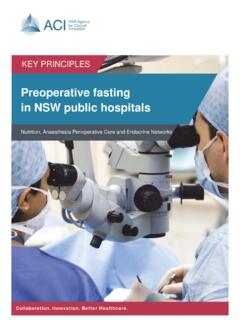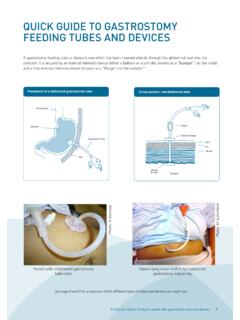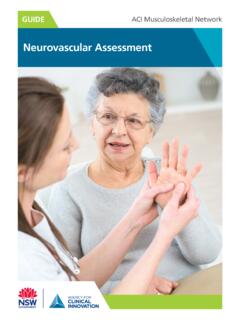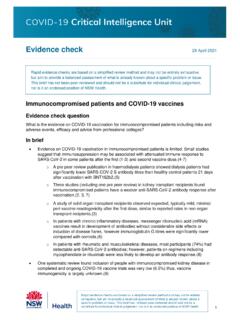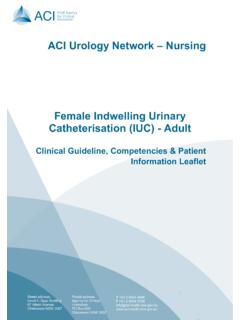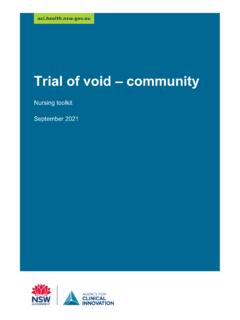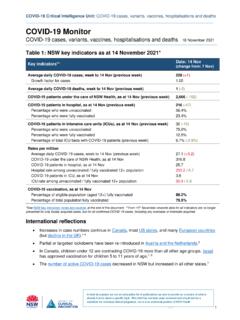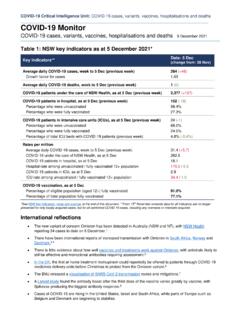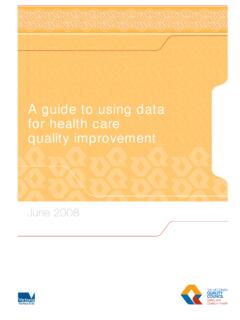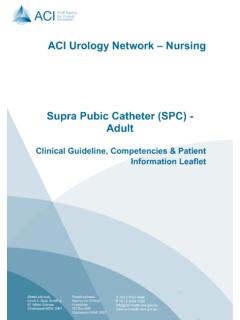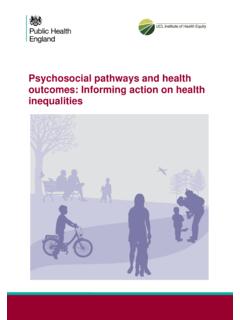Transcription of Evidence Check- Sotrovimab
1 COVID-19 Critical Intelligence Unit: Sotrovimab In brief Sotrovimab 21 January 2022. Introduction Sotrovimab (XEVUDY), is a monoclonal antibody treatment for Monoclonal antibodies are proteins, made in the laboratory, that mimic the immune system. They bind to a specific target in the case of Sotrovimab , to the spike protein of SARS-CoV-2. It appears to prevent membrane fusion after the virus binds to the human ACE2 Regulatory context Australia Sotrovimab is provisionally approved and included in the Australian Register of Therapeutic Goods (ARTG).
2 It is for the treatment of adults and adolescents (aged 12 years and over and weighing at least 40 kg) with COVID-19 who do not require initiation of oxygen due to COVID- 19 and who are at increased risk of progression to hospitalisation or The Advisory Committee on Medicines (ACM) notes that patient selection or stratification should consider comorbidities, particularly multiple combinations of comorbidities, such as: diabetes requiring medication, obesity, chronic kidney disease, congestive heart failure, chronic obstructive pulmonary disease, and asthma requiring medication.
3 It confirmed that Sotrovimab (XEVUDY) should not be used in hospitalised patients or those who require oxygen therapy due to The NSW Health model of care for the use of anti-SARS-CoV-2 monoclonal antibodies recommends that Sotrovimab is preferred over casirivimab and imdevimab for treatment of the Omicron variant of Regulatory context international The UK Medicines and Healthcare products Regulatory Agency approved Sotrovimab for use in people aged 12 years and older (weighing over 40kg) who have mild to moderate COVID-19. infection and at least one risk factor for developing severe illness ( obesity, older age, diabetes, or heart disease).
4 4. The FDA issued emergency use authorisation of Sotrovimab for treatment of mild-to-moderate COVID-19 in patients 12 years and older (weighing at least 40kg) at high risk for progression to severe COVID-19. Sotrovimab was not authorised for use in patients hospitalised due to COVID-19, requiring oxygen therapy due to COVID-19, or requiring an increase in baseline oxygen flow rate due to , 6. The European Medicines Agency recommended authorising Sotrovimab for treating COVID-19. in patients 12 years and older (and weighing over 40kg) who do not require supplemental oxygen and who are at increased risk of severe disease.
5 7. Health Canada has authorised Sotrovimab for treatment of patients with mild to moderate COVID-19 infection at high risk of hospitalisation and/or Prescribers should consider national and international guidelines when assessing risk. Sotrovimab should be administered as soon as possible after the onset of symptoms and confirmation of 1. COVID-19 Critical Intelligence Unit: Sotrovimab Clinical studies research Evidence Interim data from a phase 3 trial (COMET-ICE) show the risk of disease progression was reduced by 85%.The trial involved 583 adult outpatients with mild to moderate COVID-19 who were 55 years old or had at least one comorbidity (diabetes, obesity, chronic kidney disease, heart failure, COPD, or moderate to severe asthma).
6 10. o Patients were randomised to receive a single intravenous infusion of 500mg of Sotrovimab or placebo. The primary endpoint, progression of COVID-19 (hospitalisation for >24 hours or death) by day 29, occurred in 1% (3 out of 291) of patients who received Sotrovimab and in 7% (21 out of 292) of those who received placebo (p= ).10. o Any adverse events occurred in 17% (73 out of 430) of those who received Sotrovimab and 19% (19 out of 438) of those who received placebo. o Serious adverse event occurred in 2% (7 out of 430) of those who received Sotrovimab and 6% (26 out of 438) of those who received placebo.
7 O There were no deaths in the Sotrovimab group and two deaths (<1%) in the placebo group. Full results from the COMET-ICE trial (preprint) show that Sotrovimab can be an effective treatment option for non-hospitalised patients with mild to moderate COVID-19. o All-cause hospitalisation longer than 24 hours or death: 1% (6 out of 528) with Sotrovimab and 6% (30 out of 529) with placebo; reduced by 79%. o Emergency room visits, hospitalisation of any duration, or death: 2% (13 out of 528) with Sotrovimab and 7% (39 out of 529) with placebo; reduced by 66%.
8 O Severe/critical respiratory COVID-19: 1% (7 out of 528) with Sotrovimab and 5% (28 out of 529) with placebo; reduced by 74%. o Required high-flow oxygen, oxygen via nonrebreather mask, or mechanical ventilation: 0% (0 out of 528) with Sotrovimab and 3% (14 out of 529) with placebo. o Similar rates of adverse events in both the Sotrovimab and the placebo A phase 3 trial, COMET-TAIL, data showed that intramuscular administration of Sotrovimab had a similar efficacy to intravenous administration for the early treatment of mild-to-moderate COVID-19 in high-risk, non-hospitalised adults and adolescents (12 years of age and older).
9 The COMET-TAIL trial enrolled 983 patients up to seven days after onset of symptoms. o Progression to hospitalisation for more than 24 hours or death through Day 29: in the intramuscular arm and in the intravenous arm. o Rates of serious adverse events and Grade 3-4 adverse events: similar in both arms and both were under 1%.12. A phase 2 trial, COMET-PEAK, data showed equivalence on the virological response between the intramuscular and intravenous administration of Dosage and administration The NSW Therapeutic Advisory group recommended dose is 500mg as a single dose intravenous infusion over 30 o If the solution cannot be used immediately after dilution, it can be refrigerated for up to 24 hours or left at room temperature for up to six hours, including infusion time.
10 The models of care for the use of anti-SARS-CoV-2 monoclonal antibodies in NSW. recommends that Sotrovimab infusion may be delivered in a range of settings, including 2. COVID-19 Critical Intelligence Unit: Sotrovimab inpatient, outpatient or outreach settings, depending on local requirements. The choice of setting should consider storage and transport of the drug in respect of the cold chain, preparation of the infusion and administration and A living WHO guideline on drugs for COVID-19 suggests a single dose of 500mg intravenous infusion over 30 Action against SARS-CoV-2 variants Sotrovimab appears to retain activity against Alpha; Beta; Gamma; Epsilon; Iota; and Delta variants of Treatment-emergent epitope variants were detected in eight patients who received Sotrovimab in COMET-ICE.
